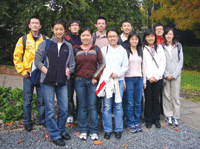University libraries in the UK are being put under intensifying pressure by the rising number of international students, says a report. The study by the Society of College, National and University Libraries (Sconul) says that increased demand from an ever-wider range of students is causing problems for libraries whose budgets have been static in recent years.
Overseas students tend to require more help than home students. The report says that many need what are in effect “exclusive” services just to stay on a level playing field with UK nationals. Overseas students pay very high fees, and they are typically among the most diligent students on campus.
Moira Bent, liaison librarian at the University of Newcastle and a national teaching fellow, says the extra demand has increased the burden on librarians and the range of cultural and other issues they must deal with. In one incident at Newcastle, a Middle Eastern student was shocked to find a copy of the Koran on a low shelf — something library staff were not aware would cause offence. “He came to us very distressed and said it was extremely disrespectful to have the Koran on a bottom shelf,” recalls Bent. “It was there because that’s where it fitted in the classification sequence, but… we had to reorganise the religious studies section so it was on a top shelf.”
 Alongside cultural issues are obstacles such as the language barrier, varying levels of IT literacy and experience of different library systems. Another problem is the gap between students’ expectations and the service on offer. In one incident cited, a group of Chinese students studying for a Masters degree in business at an unnamed university felt so strongly about the poor service that they returned as a group to China. One of the reasons they gave was that they had expected the library to provide each of them with all the textbooks they required — they were dismayed to find they had to take turns to use library copies.
Alongside cultural issues are obstacles such as the language barrier, varying levels of IT literacy and experience of different library systems. Another problem is the gap between students’ expectations and the service on offer. In one incident cited, a group of Chinese students studying for a Masters degree in business at an unnamed university felt so strongly about the poor service that they returned as a group to China. One of the reasons they gave was that they had expected the library to provide each of them with all the textbooks they required — they were dismayed to find they had to take turns to use library copies.
Karen Senior, head of the library at the University of Bolton and leader of the research, says university websites are sometimes geared towards “selling the product” to potential students rather than giving accurate information about the services available. “International students have paid a lot of money and their expectations in some cases are sky high,” she says. “I don’t think universities deliberately mislead international students but they don’t make it explicit enough what they can offer and what they can’t.”
“Librarians are beginning to feel these students ought to be addressed in a more specific way rather than bunched in with all students,” she adds.
Islam image improvement centres
Two new research centres that aim to improve understanding between the Muslim world and the West were launched in early May at the universities of Edinburgh and Cambridge, thanks to a £16 million (Rs.136 crore) donation. The centres have each won £8 million from the Kingdom Foundation, set up by entrepreneur and philanthropist Prince Alwaleed bin Talal bin Abdulaziz Al-Saud of the Saudi Arabian royal family.
Comments Carole Hillenbrand, head of Edinburgh’s department of Islamic and Middle Eastern studies: “This is the biggest thing to hit Islamic studies in the UK ever. It is the biggest donation to the humanities that the University of Edinburgh has ever received.” The centres will soon make a range of appointments, including two directorships, post- doctoral fellowships and fully funded doctoral students. Yasir Suleiman, who recently left Edinburgh to take up the chair of modern Arabic studies at Cambridge, says projects will include Muslim identities in the UK and how Islam and Muslims are represented in the media.
“There is ignorance and phobia about Islam. Our major aim is to improve public knowledge of Islam. Not just in the present context but about the many, many achievements of the Muslim world in the past. If you improve knowledge you improve understanding, and we can really build bridges,” says Hillenbrand.
The two centres will work closely together but will also have links to academic centres already set up by the Kingdom Foundation at Georgetown and Harvard universities in the US, and the American universities in Beirut and Cairo.
Prof. Suleiman stresses that there will be no interference in the direction of the centres’ research. “We have made contact with our colleagues in the States and have been assured there have been absolutely no attempts at interference at any stage. There is a very clear understanding in the Kingdom Foundation that if these centres are to be seen as academically respectable, their integrity is absolutely sacrosanct,” he says.
Prince Alwaleed, said to be among the five wealthiest people in the world, offered a $10 million donation to New York’s relief efforts after the September 11 terrorist attack on the World Trade Centre, but the money was rejected by Mayor Rudy Giuliani after the prince said the US should re-examine its policies in the Middle East.